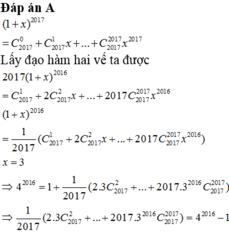

Hãy nhập câu hỏi của bạn vào đây, nếu là tài khoản VIP, bạn sẽ được ưu tiên trả lời.



Xét khai triển:
\(\left(1+x\right)^n=C_n^0+C_n^1x+C_n^2x^2+C_n^3x^3+...+C_n^nx^n\)
Đạo hàm 2 vế:
\(n\left(1+x\right)^{n-1}=C_n^1+2C_n^2x+3C_n^3x^2+...+nC_n^nx^{n-1}\)
Thay \(x=1\) và \(n=2017\) vào ta được:
\(2017.2^{2016}=C_{2017^1}+2C_{2017}^2+3C_{2017}^3+...+2017.C_{2017}^{2017}\)

Xét khai triển:
\(\left(1+x\right)^{2017}=C_{2017}^0+xC_{2017}^1+x^2C_{2017}^2+...+x^{2017}C_{2017}^{2017}\)
Lấy tích phân 2 vế:
\(\int\limits^1_0\left(1+x\right)^{2017}=\int\limits^1_0\left(C_{2017}^0+xC_{2017}^1+...+x^{2017}C_{2017}^{2017}\right)\)
\(\Leftrightarrow\dfrac{2^{2018}-1}{2018}=C_{2017}^0+\dfrac{1}{2}C_{2017}^1+...+\dfrac{1}{2018}C_{2017}^{2017}\)
Vậy \(S=\dfrac{2^{2018}-1}{2018}\)

\(S=\dfrac{1}{2018!\left(2019-2018\right)!}+\dfrac{1}{2016!\left(2019-2016\right)!}+...+\dfrac{1}{2!\left(2019-2\right)!}+\dfrac{1}{0!\left(2019-0!\right)}\)
\(\Rightarrow2019!.S=\dfrac{2019!}{2018!\left(2019-2018\right)!}+\dfrac{2019!}{2016!\left(2019-2016\right)!}+...+\dfrac{2019!}{2!\left(2019-2\right)!}+\dfrac{2019!}{0!\left(2019-0\right)!}\)
\(=C_{2019}^{2018}+C_{2019}^{2016}+...+C_{2019}^2+C_{2019}^0\)
\(=\dfrac{1}{2}\left(C_{2019}^0+C_{2019}^1+...+C_{2019}^{2018}+C_{2019}^{2019}\right)\)
\(=\dfrac{1}{2}.2^{2019}=2^{2018}\)
\(\Rightarrow S=\dfrac{2^{2018}}{2019!}\)

\(\Leftrightarrow\dfrac{2}{2}+\dfrac{2}{6}+\dfrac{2}{12}+\dfrac{2}{20}+...+\dfrac{2}{x\left(x+1\right)}=\dfrac{4032}{2017}\)
\(\Leftrightarrow2\left(\dfrac{1}{2}+\dfrac{1}{6}+\dfrac{1}{12}+...+\dfrac{1}{x\left(x+1\right)}\right)=\dfrac{4032}{2017}\)
\(\Leftrightarrow1-\dfrac{1}{2}+\dfrac{1}{2}-\dfrac{1}{3}+...+\dfrac{1}{x}-\dfrac{1}{x+1}=\dfrac{2016}{2017}\)
\(\Leftrightarrow1-\dfrac{1}{x+1}=\dfrac{2016}{2017}\)
\(\Leftrightarrow\dfrac{1}{x+1}=\dfrac{1}{2017}\)
=>x+1=2017
hay x=2016

Không tìm được vì phương trình m(m+1) = 2017 không có nghiệm tự nhiên
